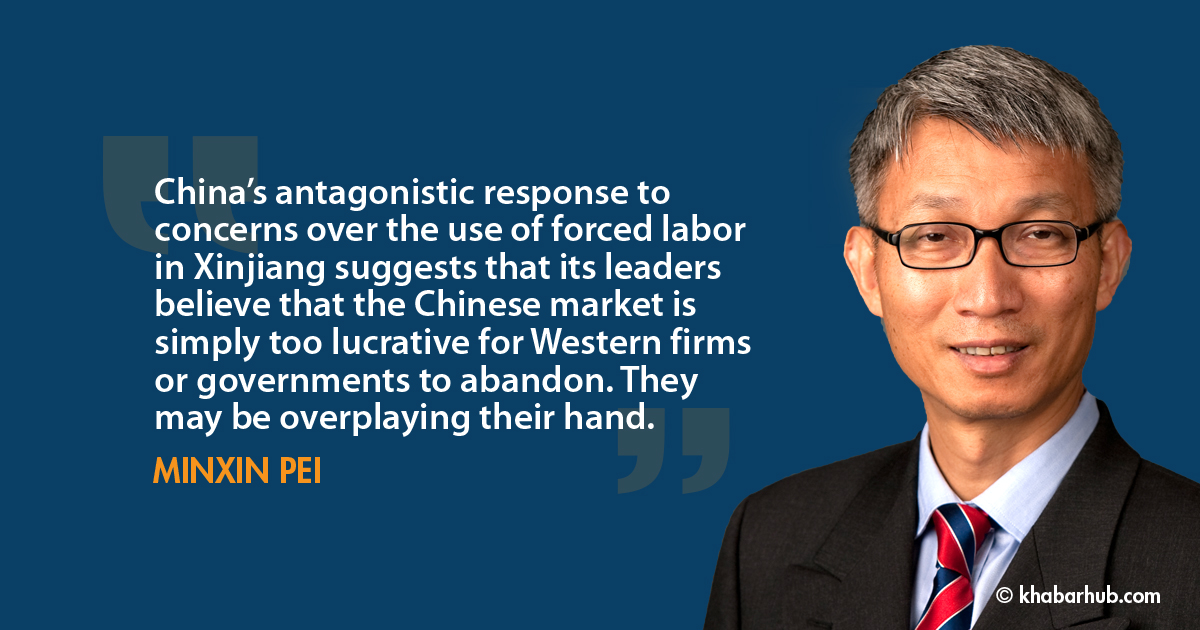Early last month, China’s rubber-stamp legislature, the National People’s Congress, officially approved the country’s 14th Five-Year Plan.
The strategy was supposed to demonstrate that China has a long-term economic vision that will enable it to thrive, despite the country’s geopolitical contest with the United States. But before the ink on the NPC’s stamp could dry, China had already begun sabotaging the plan’s chances of success.
The 14th Five-Year Plan’s centerpiece is the “dual-circulation” strategy, according to which China will aim to foster growth based on domestic demand and technological self-sufficiency.
This will not only reduce China’s reliance on external demand; it will also increase the reliance of its major trading partners – except the US – on access to its market and increasingly high-tech manufactures.
China has been laying the groundwork for this strategy for a while. Notably, at the end of last year, President Xi Jinping concluded the Comprehensive Agreement on Investment (CAI) with the European Union.
He had to make some concessions to get there, but it was worth it: the deal had the potential not only to deepen EU-China ties, but also to drive a wedge between Europe and the US.
China seems confident that its bullying tactics will succeed. After all, Western multinationals don’t want to be driven out of China, an important growth market.
But Xi is now undermining his own good work, by poisoning relations with critical trading partners. Over the last couple of weeks, China has blacklisted several members of the European Parliament, British and Canadian lawmakers, and academics and research institutions in Europe and the United Kingdom.
To be sure, the sanctions were retaliatory: the EU, the UK, and Canada had sanctioned a small number of Chinese officials who are implicated in ongoing human-rights abuses against the largely Muslim Uighur minority in Xinjiang province.
While these abuses are nothing new, recent reports that forced Uighur labor is being used to harvest cotton have brought them to the fore.
China is sanctioning its critics to display its indignation at these accusations, which it insists are politically motivated lies. But whatever message the sanctions are supposed to send, they are unlikely to be worth the cost.
Canada, Europe, and the UK have so far remained relatively neutral in the Sino-American rivalry – and it is in China’s interests that they stay that way.
China can afford an economic decoupling with the US (though it will be costly). It cannot afford a simultaneous decoupling with the rest of the major Western economies.
Already, the CAI is under threat. The agreement still needs to be approved by the European Parliament. But, to protest Chinese sanctions against some of its members, the Parliament canceled a recent meeting to discuss it.
Some lawmakers now argue that China should ratify the International Labor Organization’s conventions on forced labor before the CAI is ratified.
Further undermining its economic prospects, China is attacking private corporations for having expressed concerns over forced-labor allegations.
Last year, the Swedish apparel retailer H&M announced that it would no longer use cotton sourced in Xinjiang, because it was too difficult to conduct “credible due diligence” there.
As the conversation about Xinjiang cotton has heated up, H&M’s statement has resurfaced – and drawn a barrage of criticism.
More broadly, an exodus of Western multinationals from China would inevitably force the supply chains that serve them to move as well, resulting in the closure of Chinese factories and the loss of millions of jobs.
China’s leading e-commerce companies have pulled H&M products from their platforms, and Chinese celebrities have canceled deals with the brand.
And, encouraged by state media, a movement to boycott H&M – as well as other Western brands that refuse Xinjiang cotton, including Nike, New Balance, and Burberry – is gathering steam.
China seems confident that its bullying tactics will succeed. After all, Western multinationals don’t want to be driven out of China, an important growth market.
And, indeed, H&M has already released a new statement highlighting its “long-term commitment” to China and expressing its dedication to “regaining the trust and confidence” of its “customers, colleagues, and business partners” there.
Nonetheless, China may be overplaying its hand. Just as Western multinationals want to sell their goods to Chinese consumers, Chinese firms need these companies to keep sourcing inputs from them. These are mutually dependent relationships.
Moreover, while the size of China’s market may be appealing enough to draw concessions from multinationals, it is not worth jeopardizing their reputations in the West, which still accounts for the vast majority of their revenues.
For example, H&M’s top two markets are the US and Germany; China is its third-largest market, but accounted for about only 5% of its total revenue in 2020.
In other words, H&M can afford to lose access to the Chinese market. But its 621 Chinese suppliers may not be able to afford losing H&M as a buyer.
They should recall that, not too long ago, they were absolutely certain that the US could not afford an economic decoupling from China.
More broadly, an exodus of Western multinationals from China would inevitably force the supply chains that serve them to move as well, resulting in the closure of Chinese factories and the loss of millions of jobs.
There is still time for China’s government to reverse course. That means, for starters, allowing independent experts to conduct an investigation of cotton farms in Xinjiang.
If China really isn’t using forced labor, this is the best way to prove it – and improve relations with Western businesses and governments.
But such a sensible response seems unlikely, not least because China’s leaders remain convinced that its market is simply too important to abandon.
They should recall that, not too long ago, they were absolutely certain that the US could not afford an economic decoupling from China.
They were wrong then, and they may well be wrong now. The difference is that, this time, China cannot afford a decoupling, either.
(Minxin Pei is Professor of Government at Claremont McKenna College and a non-resident senior fellow at the German Marshall Fund of the United States)
Copyright: Project Syndicate









Comment